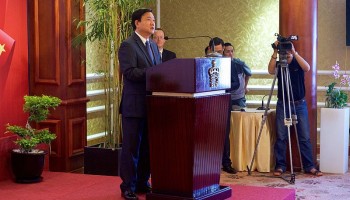In their annual report to the National People's Congress on Monday, China’s chief justice and prosecutor said that fighting corruption and terrorism will be the judiciary’s top priority this year, reports the South China Morning Post.
Dozens of high-ranking government officials and businessmen have already been arrested. According to Bloomberg, many of those targeted are associated with Zhou Yongkang, a retired member of the highest governing body in China, the Politburo Standing Committee.
In his report to almost 3,000 lawmakers, President of the Supreme People's Court Zhou Qiang said, "We will severely punish offenders who harm national security, especially those who carry out terrorist attacks, pose serious threats to social security and damage military facilities, to safeguard national security and social stability and help build up people's sense of security,” reports the South China Morning Post.
Harvard professor Anthony Saich says that this is most ambitious anti-corruption sweep since Mao Zedong was in power.
In 2013 Chinese courts convicted and punished 31,000 people for embezzlement, bribery, and breach of duty, Xinhuanet newspaper reports, targeting both "tigers and flies": high and low ranking officials.
However, the numbers do not show the full picture of who is being targeted, and how.
Party members are using an internal investigative and disciplinary process called “shuanggui” to scour out corruption, describing the process as "an order [for] officials to appear at a designated time and place to account for their actions.
The process itself is shrouded in secrecy. Separate from the state justice system, it allows for the use of secret jails and torture.
Unlike the state justice system, party investigators bringing suspects into detention centers don’t have to inform their relatives. In addition, there’s no way to know whether the detentions, which do not involve the courts, are legitimate or merely a way to exact revenge or silence dissidents.
Zhou Wangyan, head of the Liling city land resources bureau, and three other party members told the AP that they were detained and tortured because of political vendettas.
Zhou, whose femur was broken during his interrogation, said he was whipped with wires, almost drowned, forced to eat excrement, and was deprived of food and sleep.
The others said they were hung from windows and dragged along the floor, face down, by their feet.
Party representatives contacted by the AP denied the abuses alleged by Zhou.
One official did say last month that in recent years around 90 percent of major corruption cases involving party members were cracked through the shuanggui system. According to the AP, corruption experts believe that several thousand people are secretly detained every year for weeks or months at a time.
Members of the party acknowledge that it is “legally problematic but say it's indispensable in fighting corruption,” says the AP.
Three months and many injuries and threats after Zhou was brought in for interrogation he broke down, writing a resignation letter and confessing to accepting US$6,600 (40,000 yuan) in bribes.
"I still believe that the Chinese Communist Party is a good ruling party," Zhou told the AP. "I also believe that not too far in the future, there will be a place in the People's Republic of China in which we can speak freely, a place where my terrible case will receive a fair and just response."






